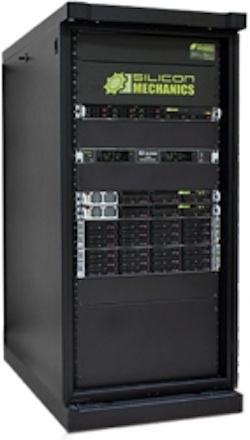Tufts U Wins Silicon Mechanics HPC Cluster
- By Dian Schaffhauser
- 04/08/13

Tufts University's new HPC cluster from Silicon Mechanics includes compnents from NVIDIA, AMD, Kingston Technology, Mellanox Technologies, Supermicro, Seagate, and Bright Computing. |
A team of researchers at Tufts University has scored a $78,000 high-performance computing cluster (HPC), thanks to a grant competition sponsored by HPC integrator Silicon Mechanics. A diverse group at the Medford, MA-based institution is being guided by a Tufts professor whose research focuses on how body parts "form, heal, and regenerate."
The multidisciplinary team will use the new cluster to develop the world’s first "automated platform for the systematic discovery of emergent patterning properties from real biological data." Participants include collaborators from Tufts' biology, computer science, biomedical engineering, and mathematics departments, as well as researchers from the Universidad de Sevilla in Spain.
"The interdisciplinary group will use the cluster to develop a new kind of bioinformatics that integrates functional genetic data into a true systems-level understanding of the remarkable mechanisms that enable living beings to build, control, and dynamically repair their bodies," said Tufts Biology Professor Michael Levin. "Running the simulation environment we envisage requires a very high computational cost, which means the project will greatly benefit by the high-performance computer cluster awarded in this grant."
The computer system was granted as part of Silicon Mechanics' second annual "research cluster grant" competition. Last year's cluster went to Saint Louis University, which is using its system for a number of research areas, including aerospace and mechanical engineering, biology, chemistry, and other disciplines.
The latest cluster includes components from Silicon Mechanics, NVIDIA, AMD, Kingston Technology, Mellanox Technologies, Supermicro, Seagate, and Bright Computing. The system has NVIDIA Tesla M2090 GPUs and AMD Opteron 6300 series processors. In fact, one of the criteria for applications was the importance of CPU and GPU technologies to the research. Other scoring looked at the proposal’s research goals, cross-discipline collaboration, and student access to the equipment.
About the Author
Dian Schaffhauser is a former senior contributing editor for 1105 Media's education publications THE Journal, Campus Technology and Spaces4Learning.